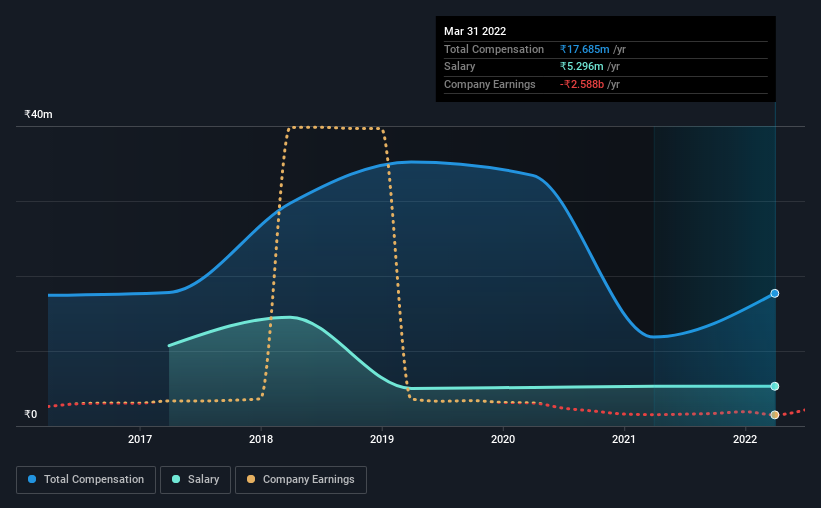- India
- /
- Hospitality
- /
- NSEI:THOMASCOOK
Shareholders Will Most Likely Find Thomas Cook (India) Limited's (NSE:THOMASCOOK) CEO Compensation Acceptable

Under the guidance of CEO Mahesh Iyer, Thomas Cook (India) Limited (NSE:THOMASCOOK) has performed reasonably well recently. This is something shareholders will keep in mind as they cast their votes on company resolutions such as executive remuneration in the upcoming AGM on 28 September 2022. Based on our analysis of the data below, we think CEO compensation seems reasonable for now.
See our latest analysis for Thomas Cook (India)
How Does Total Compensation For Mahesh Iyer Compare With Other Companies In The Industry?
According to our data, Thomas Cook (India) Limited has a market capitalization of ₹34b, and paid its CEO total annual compensation worth ₹18m over the year to March 2022. We note that's an increase of 49% above last year. While we always look at total compensation first, our analysis shows that the salary component is less, at ₹5.3m.
In comparison with other companies in the industry with market capitalizations ranging from ₹16b to ₹64b, the reported median CEO total compensation was ₹15m. This suggests that Thomas Cook (India) remunerates its CEO largely in line with the industry average. What's more, Mahesh Iyer holds ₹19m worth of shares in the company in their own name, indicating that they have a lot of skin in the game.
| Component | 2022 | 2021 | Proportion (2022) |
| Salary | ₹5.3m | ₹5.3m | 30% |
| Other | ₹12m | ₹6.6m | 70% |
| Total Compensation | ₹18m | ₹12m | 100% |
Speaking on an industry level, nearly 99% of total compensation represents salary, while the remainder of 1% is other remuneration. It's interesting to note that Thomas Cook (India) allocates a smaller portion of compensation to salary in comparison to the broader industry. It's important to note that a slant towards non-salary compensation suggests that total pay is tied to the company's performance.

Thomas Cook (India) Limited's Growth
Over the last three years, Thomas Cook (India) Limited has shrunk its earnings per share by 67% per year. In the last year, its revenue is up 138%.
The decrease in EPS could be a concern for some investors. But in contrast the revenue growth is strong, suggesting future potential for EPS growth. It's hard to reach a conclusion about business performance right now. This may be one to watch. Although we don't have analyst forecasts, you might want to assess this data-rich visualization of earnings, revenue and cash flow.
Has Thomas Cook (India) Limited Been A Good Investment?
Most shareholders would probably be pleased with Thomas Cook (India) Limited for providing a total return of 38% over three years. This strong performance might mean some shareholders don't mind if the CEO were to be paid more than is normal for a company of its size.
To Conclude...
Some shareholders will be pleased by the relatively good results, however, the results could still be improved. Despite robust revenue growth, until EPS growth improves, shareholders may be hesitant to increase CEO pay by too much.
CEO compensation is an important area to keep your eyes on, but we've also need to pay attention to other attributes of the company. That's why we did our research, and identified 3 warning signs for Thomas Cook (India) (of which 1 makes us a bit uncomfortable!) that you should know about in order to have a holistic understanding of the stock.
Of course, you might find a fantastic investment by looking at a different set of stocks. So take a peek at this free list of interesting companies.
Valuation is complex, but we're here to simplify it.
Discover if Thomas Cook (India) might be undervalued or overvalued with our detailed analysis, featuring fair value estimates, potential risks, dividends, insider trades, and its financial condition.
Access Free AnalysisHave feedback on this article? Concerned about the content? Get in touch with us directly. Alternatively, email editorial-team (at) simplywallst.com.
This article by Simply Wall St is general in nature. We provide commentary based on historical data and analyst forecasts only using an unbiased methodology and our articles are not intended to be financial advice. It does not constitute a recommendation to buy or sell any stock, and does not take account of your objectives, or your financial situation. We aim to bring you long-term focused analysis driven by fundamental data. Note that our analysis may not factor in the latest price-sensitive company announcements or qualitative material. Simply Wall St has no position in any stocks mentioned.
About NSEI:THOMASCOOK
Thomas Cook (India)
Offers integrated travel services in India and internationally.
Excellent balance sheet and fair value.
Similar Companies
Market Insights
Community Narratives




